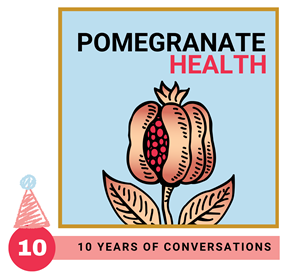Pomegranate Health
Welcome to Pomegranate Health — a podcast about the culture of medicine.

Pomegranate Health is celebrating 10 Years of Conversations. To get a guided tour of the back-catalogue and how the podcast addresses all the themes of professional practice take a listen to Episode 132 and Episode 125.
Pomegranate Health is a podcast about the culture of medicine. You'll hear insights from clinicians, researchers, and advocates as they tackle important questions — like how to make difficult clinical and ethical decisions without being influenced by bias, how to communicate better with patients and colleagues, and how to provide healthcare that’s both efficient and fair.
If you're a Fellow of the RACP, time spent listening can be counted toward your CPD hours. And if you're a Basic Physician Trainee, the [Case Report] series can help you prepare for your long case clinical exams.
This is also the home of [IMJ On-Air], featuring authors from the Internal Medicine Journal sharing their latest research. Plus, the [Journal Club] episodes give RACP researchers a space to talk through their work published in other academic journals.
We’d love to hear your thoughts — feel free to leave a comment on each episode or send feedback and ideas to podcast@racp.edu.au.
Latest episodes
Ep69: Gendered Medicine—Funding and Research
It’s been said that the health needs of women are undervalued by our fee-for-service model, down to individual item numbers in the Medicare Benefits Schedule. There’s also evidence that disease predominantly experienced by females receive less research investment. Is this blatant sexism or a symptom of other structural imbalance? And what do we do about it?
Ep68: Gendered Medicine- Pain
Gender can be considered a social determinant of health given the taboos and stereotypes around women's health. We discuss the responsibility Medicine has in supporting more equitable outcomes.
Ep67: Boosting Public Health in the Indo-Pacific
Australia’s Indo-Pacific Centre for Health Security provides development assistance to health services as far flung as Fiji, Cambodia and Timor L’Este. Its mission is always tailored to the needs of the development partner, and had to adapt quickly with the sudden demands of the COVID-19.
Ep66: Gendered Medicine- Heart Disease
Cardiovascular disease is the leading cause of death for women in most of the industrialized world. Women who suffer from this die at significantly higher rates than men because of discrepancies in the quality of care they receive. In this episode we explore the subtle biases that nudge male and female patients down different health pathways.
Ep65: A New Script for Global Public Health
Intellectual property law has influenced pharmaceutical development and marketing for at least 25 years ago. But it’s not clear whether this is actually the best model for stimulating innovation and addressing the most important global health problems. Closer to home, we also discuss a solution to the jurisdictional conflicts in responding to the pandemic.
Ep64: Big Pharma and the People’s Vaccine
The COVID-19 pandemic has stimulated a frenzy of vaccine development never seen before, but also examples of hoarding, price hikes and vaccine nationalism. We discuss where the intellectual property rules have come from and where exceptions are sometimes made for public health emergencies.
Ep63: the WHO’s Biggest Test
During the COVID-19 crisis there has been some criticism of the World Health Organisation as to whether it declared a pandemic soon enough or covered up for China’s failings. In this podcast we examine the role and responsibilities it shares with its member states and where the straining points have been.
Ep62: Essential Ethics in Adolescent Health
Two more case studies from the Essential Ethics podcast tackling the question of when refusal of treatment should or shouldn’t be accepted by a medical team, and how much autonomy does an adolescent have. Featuring clinicians from the oncology department at the Royal Children’s Hospital, Melbourne.
Ep61: Delirium Part 2- Prevention and Management
Delirium can be precipirated by a host of environmental triggers that are highly modifiable. Anything that contributes to a person’s disorientation and discomfort can increase the likelihood of a delirium episode. While a lot of these factors are compounded in elderly and frail patients, delirium can be reversed in a majority of patients by non-pharmacological means.
Ep60: Delirium Part 1- Detection and Causes
Delirium is an acute disturbance of consciousness, attention, cognition or perception. It’s associated with an increased risk of falls, dementia and high dependency care, and all of this adds up to higher mortality. About a third of patients admitted to ICU or approaching the end of life, experience delirium. But it’s notoriously underdiagnosed, so in this episode we talk about the presentations and detection of delirium. We also go through some of the medical and iatrogenic risk factors.